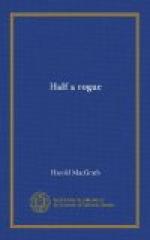Warrington put the letter away, placed it carefully among the few things he held of value. It would not be true to say that it left him unaffected. There was an innocent barb in this girlish admiration, and it pierced the quick of all that was good in him.
“Good and kind and wise,” he mused. “If only the child knew! Heigh-ho! I am kind, sometimes I’ve been good, and often wise. Well, I can’t disillusion the child, happily; she has given me no address.”
He rose, wheeled his chair to a window facing the street, and opened it. The cool fresh April air rushed in, clearing the room of its opalescent clouds, cleansing his brain of the fever that beset it. He leaned with his elbows on the sill and, breathed noisily, gratefully. Above, heaven had decked her broad bosom with her flickering stars, and from the million lamps of the great city rose and floated a tarnished yellow haze. So many sounds go forth to make the voices of the night: somewhere a child was crying fretfully, across the way the faint tinkle of a piano, the far-off rattle of the elevated, a muffled laugh from a window, above, the rat-tat of a cab-horse, the breeze in the ivy clinging to the walls of the church next door, the quarrelsome chirp of the sleepy sparrows; and then, recurrence. Only the poet or the man in pain opens his ears to these sounds.
Over on Broadway a child of his fertile brain was holding the rapt attention of several hundred men and women; and across the broad land that night four other dramas were being successfully acted. People were discussing his theories, denouncing or approving his conception of life. The struggle was past, his royalties were making him rich. And here he was this night, drinking the cup of bitterness, of unhappiness, the astringent draft of things that might and should have been. The coveted grape was sour, the desired apple was withered. Those who traverse the road with Folly as boon companion find only emptiness.




